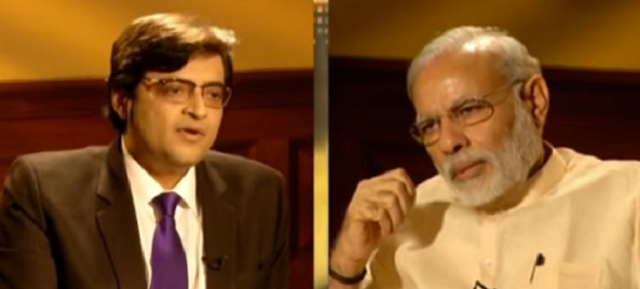Pop Stuff: New News, Old Blueprints
Are we spouting our own opinions or those of our favorite pundits; can we even tell the difference?

In tuning in to a voice like Arnab Goswami on ‘The Newshour Debate’, we risk becoming passive players in our interaction with world events.
At a recent dinner in New York, I was catching up with a close friend from Mumbai. We were trying Sichuan hot pots in a new east village spot and she was enthusiastically describing a sea change in India with respect to the female narrative. She cited feminist zine, The Ladies Finger, as a place where women explore taboo topics. So, I asked her; is it changing perceptions? Well, she told me, yes, but it’s mostly preaching to the converted. We assume that more access and more freedom of expression means more open minds. But as our news feed spills over with options we consume what resonates. I can be the ”˜educated liberal’ who gets my news from John Oliver and my Chinese food in Alphabet City, but does that make my point of view any less limited?
While globalization has become a 21st-century mantra, isolation has become its unlikely twin. Americans obsess over Trump, gun violence and racial inequality, Brits over Brexit and Indians over a globetrotting Modi. Sports fans dive from Euro 2016 into the Olympics and activists fixate on their crisis of choice. Climate change, discontent fueled by income inequality and cyber warfare might be the most prevalent threats but they take a backseat as we pick headlines, blogs and channels tailored to our tastes. As opinions proliferate across burgeoning networks, each one takes more of a stance to stand out. In tuning in to a voice, whether it is Sean Hannity on Fox or Arnab Goswami on The Newshour Debate, we risk becoming more passive players in our interaction with world events. Are we spouting our own opinions or those of our favorite pundits; can we even tell the difference? Only last month Facebook announced an update to their news feed prioritizing posts from family and friends. Ironically, the platform that propelled the Arab Spring ensures that, while six degrees of separation holds true, our world view is dominated by just one or two.
Groupthink is exacerbated as narratives on center stage are driven by the most powerful nations. On June 12, in an Orlando nightclub, the US experienced its deadliest mass shooting. While this was deservedly emblazoned across every front page, the 20 people dead in air strikes in Syria that day went largely unnoticed. Last month when Jihadists killed scores in Istanbul, Bangladesh, Baghdad and Saudi Arabia, coverage seemed perfunctory in comparison to effusive pages following the Paris attacks last year. The news dances circles around Trump because we’d rather debate a racist quip from a podium bully than hear from, let’s say, a women’s rights activist. And what more proof that we’re woefully unaware of what the other side believes than surprise that an exclusionary bigot is a US presidential front-runner.
We can’t read every point of view. But we can become more open minded by engaging the opinion furthest from us and more informed by reading the buried stories. So if you’re a liberal, watch a conservative talk show; if you think that feminists are ”˜feminazis’, spend an hour reading The Ladies Finger and if you feel Islam is the problem, take a deep dive into the disenfranchised communities spawning radicals. The scale of information flow alone won’t expand our horizons, unless we try something new on the menu.
Soleil Nathwani is a New York-based Culture Writer and Film Critic. A former Film Executive and Hedge Fund COO, Soleil hails from London and Mumbai.







